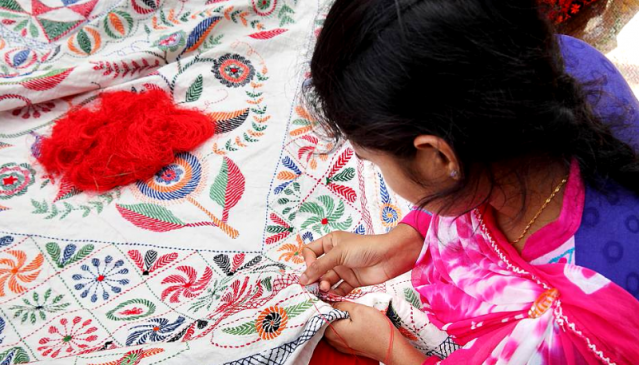Women entrepreneurs shine brightly despite barriers

The entrepreneurial spirit among women in Bangladesh is flourishing, yet many are facing significant hurdles in their path to success. Lack of mentorship and training are identified as major barriers hampering the leadership capabilities of women across various sectors.
Despite the government’s efforts towards women empowerment, including initiatives by the SME Foundation, there remains a stark reality – only 7.23 per cent of the businesses are led by women among the 8 million enterprises in Bangladesh.
The majority of these businesses operate informally, catering to both local and export markets. Acknowledging the need for intervention, stakeholders advocate for comprehensive measures addressing the root causes of gender disparity in entrepreneurship.
Key areas of focus include access to markets and credit, institutional support from ministries, women associations, and chambers, and most importantly, mentorship and training programmes tailored to women entrepreneurs.
This year, three out of seven SME Foundation award winning entrepreneurs are women, indicating that women entrepreneurs have a special role in building a developing Bangladesh.
Sapna Rani Sen from Rangpur Crafts, one of the award winners, told The Business Post, “I am a proud business owner. I work with Shataranji and jute. But my main problem is the shortage of raw materials and excessive prices.
“The price of yarn was Tk 40 per kg in 2008, which is now Tk 350 per kg. But we have not increased our product prices like that. This yarn is not available in Rangpur. It has to be collected from Narayanganj, which is very challenging for me as a woman.”
She continued, “There are some people who buy from us at cheaper prices and sell our goods at higher prices online. They earn Tk 400 on a product that originally costs Tk 40. This is unfair.”
“It is very good if the SME Foundation works in Rangpur to promote Shataranji through a cluster. I request the government to look into this matter.”
Besides, women entrepreneurs faced many challenges such as financial difficulties, harassment in obtaining licenses, and balancing household and business responsibilities.
Taslima Miji, another winner and owner of Gootipa leather brand, said, “Being a woman entrepreneur is not easy. Apart from financial problems, we have to face many other problems.
“For example, we have to suffer harassment in obtaining licenses from different sources. Besides, women have to handle both outside the house. Also in the field of loan women are given less opportunities compared to men.”
She added, “SME Foundation is the most active of all the government agencies. Every month, different training workshops are organised, and women and men are getting job opportunities. I also underwent training from here, and it was a good decision.”
Another award winner Shima Saha, owner of Shima General Hospital and Diagnostic Center, said, “Hospital business is not an easy task. It is a work of service. Everyone comes here sick and we serve them at an affordable cost.
“But the problem is that some locals come here and go without paying the bills, and we cannot say anything even if we want to.”
She added, “Besides, we have many shortages of skilled medical assistants. Earlier, training under technical education was accessible, which is now discontinued. We want more opportunities in this sector.”
Speaking at a seminar organised by SME Foundation on Tuesday Industries Ministry Senior Secretary Zakia Sultana had said, “Prime Minister Sheikh Hasina is also working for women empowerment.
“It is because of her charismatic leadership that the country has become today’s digital Bangladesh and is moving towards a smart Bangladesh.”
She added, “The SME Foundation is doing a lot of work with women. We all want to work together, we want to advance women, and we will work on the development of women entrepreneurs. Women must work on empowerment.
“In that case, they should be trained to improve their skills. Intellectual property rights should be ensured.”
In response to these challenges, calls are made for the establishment of mentorship programmes, and the provision of training opportunities to enhance the skills and leadership capabilities of women entrepreneurs.
Ensuring intellectual property rights protection further emerges as a critical aspect of empowering women in business.
As Bangladesh strives towards inclusive economic growth, fostering an ecosystem that nurtures and supports women entrepreneurs is imperative.
Through collaborative efforts between government bodies, development organizations, and the private sector, the landscape for women entrepreneurship can be transformed, paving the way for a more equitable and prosperous future.



